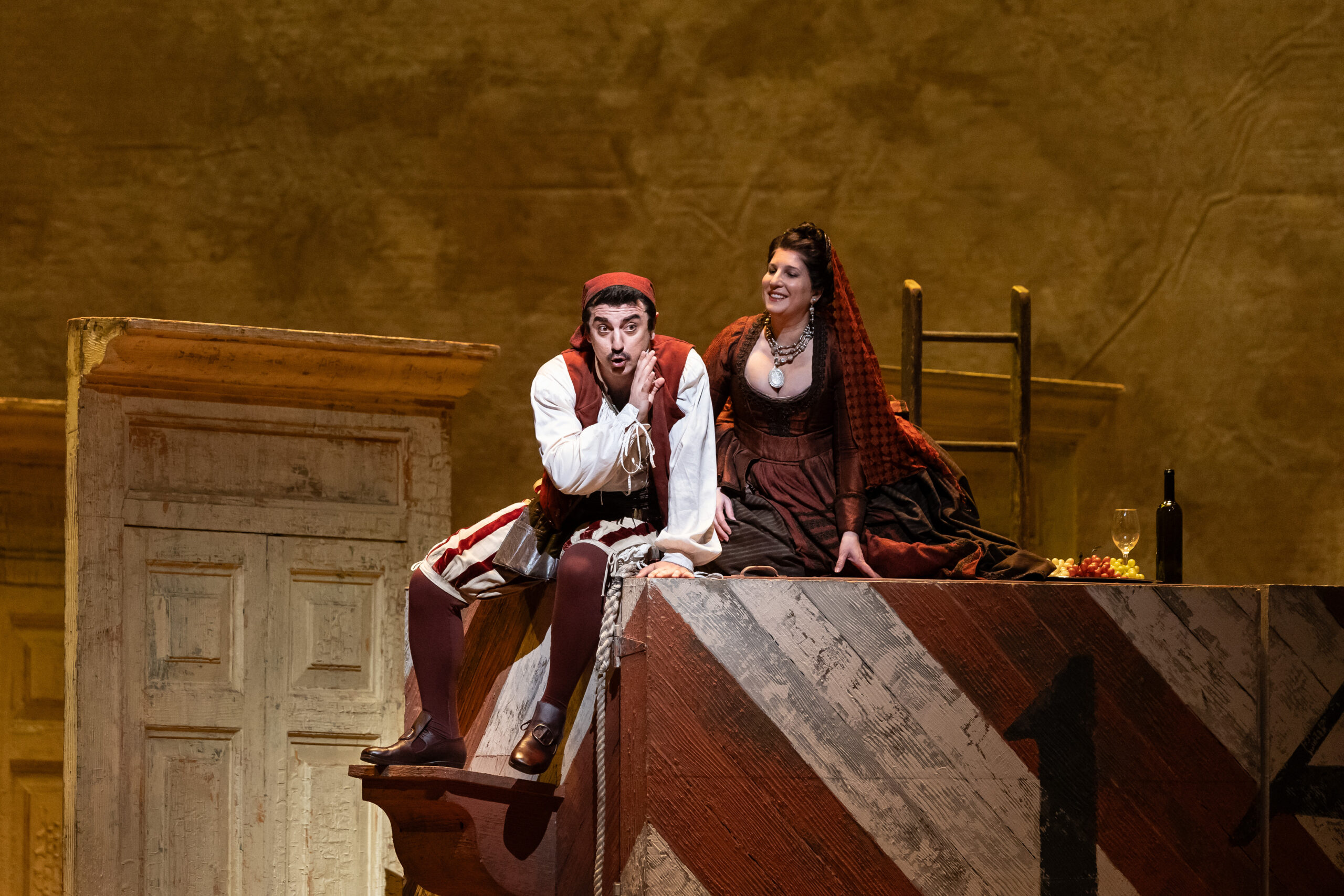He enters lying down — draped across a cart, surrounded by a bevy of women in a scene equal parts chaos and celebration. But the moment he opens his mouth, the theater shifts. With a commanding voice and pitch-perfect comic timing, baritone Davide Luciano doesn’t just sing Il Barbiere di Siviglia — he owns it. With bold gestures and mischievous charm, Luciano’s Figaro brings the Metropolitan Opera’s 4,000-seat house to roaring applause.
“It’s the best feeling in the world,” he says the morning after the show. “Singing for this audience is priceless. Americans come to enjoy themselves — not just to judge — and that makes a huge difference. Coming to New York is a sacrifice, I’m far from my family, but it’s absolutely worth it. Ten years ago, when I auditioned for the Met at 27, I was just starting out. I was trembling. When they told me I’d been cast not in one but in two productions, it was like a dream. For some, the dream is La Scala. For me, it was the Met.”

Luciano has since performed across Europe’s top houses — Dresden, Berlin, Vienna, Amsterdam, Madrid — as well as at prestigious festivals in Pesaro, Verona, Macerata, Glyndebourne, and Salzburg. But the road here wasn’t smooth. It began in the southern Italian town of Benevento.
“As a kid, music was my whole world,” he recalls. “I studied piano at the conservatory but quit at thirteen — I had no patience. I preferred playing in bars and rugby. My dad convinced me to try voice lessons, said, ‘You can make good money with music.’ So I went. Then I ran out of the room. I told my parents, ‘You go if you like it so much!’”
At 19, with dreadlocked hair and a taste for protest songs and leftist politics, he didn’t see himself in the world of classical singing — especially not the strict, monk-like training it required. But then fate intervened. Luciano met voice teacher Gioacchino Zarrelli, whose passion pulled him in. “He brought me to the Teatro San Carlo in Naples a few months later,” he says. “And that was it. I was hooked. Music and singing got into my soul.”
The soul — and the critics — agree. “An outstanding Figaro with a rich, penetrating voice,” wrote the New York Classical Review. “A standout performer with a compelling high baritone and crisp diction,” said Bachtrack, praising his effortless delivery of the tongue-twisting “Largo al factotum” — the opera’s most iconic aria (a highlight of the Met’s official Instagram feed).
Luciano’s story is one of grit and transformation. “I come from a very humble background,” he says. “My mother was 17 when I was born. My parents were just kids. I had a serious health problem at birth. I grew up in a tough place. When I found myself working alongside singers from New York, Vienna, Berlin — for them, this life was normal. For me, it was unbelievable. I had to earn everything, and that makes it even more satisfying. It’s something I hope to pass on to my son.”
Yes, Luciano is also a father. “He was born during a very uncertain moment. I was 23, still at the conservatory, not sure if I should continue singing or teach. His birth gave me the drive to try harder — to be the best version of myself. I entered Italy’s most important competition, even though my teacher thought I wasn’t ready. I pushed through, and I won. That changed everything. I joined the Accademia Rossiniana, started working, and brought my son everywhere with me — until he started school. Now he lives with my parents in Benevento.”
Does fatherhood change how he sings, how he lives? “He has a dad with a profession now, something I never had growing up. But I want him to earn everything on his own. I love him deeply — we hug, kiss, like a mother and child — but I’m also strict. I want to raise him with values.”
Luciano has sung Figaro many times — and the role fits like a glove. “I first sang it at 25, after an audition in Berlin. I’d never been abroad before then. The theater took a chance on me, and I’ve carried Figaro with me ever since. He’s not just a clown — not just the comic foil from the opening cavatina. He’s deeper. He’s like a superhero in disguise, like Spider-Man. In daily life he seems ordinary, but he has extraordinary powers. His mind, his wit, his way with words — he earns his place among the nobles through merit, not blood. That’s what makes him so compelling. He’s a symbol of human dignity and love.”
At the Met, Luciano has also sung La Bohème, though he admits that Marcello doesn’t carry the same emotional and vocal weight. “Puccini wrote mostly for tenors and sopranos. Marcello’s a charming role, but it’s hard to stand out vocally or dramatically. Only in Tosca does Puccini give the baritone something truly massive — Scarpia. I’ll be singing that next year, and it’s a beast. Vocally terrifying, dramatically complex. All baritones fear it — me included.”
For now, Luciano is taking a rare summer break. “Normally I’d be in Salzburg or Verona, but this year I want to be with family. In September, I’m back for Falstaff in Vienna, then Macbeth at the Verdi Festival in Parma. It’s a huge role, technically and theatrically exhausting. After that, back to New York for La Bohème — lighter, fun — a chance to breathe. Then Don Carlo, The Pearl Fishers in Vienna… a full season ahead.”
But for now, Luciano is Figaro — voice soaring, smile wide, taking the Met by storm.
Catch Davide Luciano as Figaro in The Barber of Seville at the Metropolitan Opera on May 8.
Conductor: Giacomo Sagripanti · Cast: Isabel Leonard, Aigul Akhmetshina, Lawrence Brownlee, Jack Swanson, Davide Luciano, Andrey Zhilikhovsky, Nicola Alaimo












